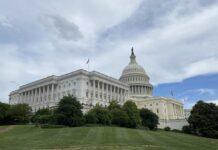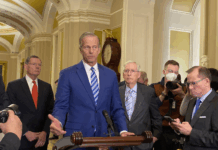
ATLANTA (AP) — The leader of a state legislative committee that’s looking at how Georgia funds K-12 public schools promised on Friday that nothing “dire and ominous” would come from any possible changes.
Nearly 40 years after then-Gov. Joe Frank Harris signed the Quality Basic Education formula into law, Senate Majority Leader Mike Dugan told members of a Senate committee that it was time to consider whether changes were needed.
“QBE was done 40-plus years ago,” the Carrollton Republican said. “The way we educate our children has changed in that time period and what this committee is to look at is are we allocating the resources to the areas of education that are most appropriate today.”
The move comes at what, in some ways, is a good time for Georgia’s $10 billion funding formula. The state has fully funded the formula for four of the last five years after 16 years in which it imposed austerity cuts each year. The formula is used to calculate how much money the state should provide each of Georgia’s 181 school districts to give them enough money to provide a good education for 1.7 million students. Over the 16 years, the state would provide only a portion of the entire amount, saying it had to cut back to balance the state budget.
But there are continuing issues with the QBE formula. It provides only a small fraction of what districts spend to buy and operate school buses. Other costs besides employee salaries are rarely adjusted for inflation. The state, for example, allocates $150 per teacher to pay for what is supposed to be eight sick days. When the formula was written, schools largely relied on textbooks, while they now increasingly rely on electronic materials. And Georgia has yet to fully fund a previous upgrade in the number of school counselors per student.
Georgia’s formula already provides extra money for students with special education needs, students learning English, students needing remediation, those studying career and technical subjects, and gifted students. The formula also provides more money for younger students than high schoolers.
The system also gives more state money to districts with low property tax bases. Lawmakers are likely to consider local property tax and sales tax collections later. Districts also get money from the federal government.
Some lawmakers also expressed interest in the state providing extra money for students in poverty.
RELATED Georgia lawmakers ponder adding poverty as factor in overhaul of state school funding formula
Another question is paying teachers more. Georgia teacher salaries are higher than any neighboring state. But take-home pay for first-year teachers lags because state health care premiums are above average.
At least three previous attempted overhauls of QBE faltered, producing few significant changes. Those overhauls were dogged by suspicion that Republicans were trying to spend less. To win support, formula writers often look to spend more, at least temporarily, to avoid creating losers who get less money.
“Ultimately what has happened every time is they think they’re going to go into it and find savings and be able to shift money around, but they go into it and find it’s going to cost more money,” said Angela Palm, a longtime lobbyist with the Georgia School Boards Association.
Dugan encouraged people to be open to possible changes.
“Humans by nature fear change more than they fear failure,” Dugan said. “And failure in my mind is not doing anything when we have the opportunity to improve the quality of our education for our students moving forward.”






